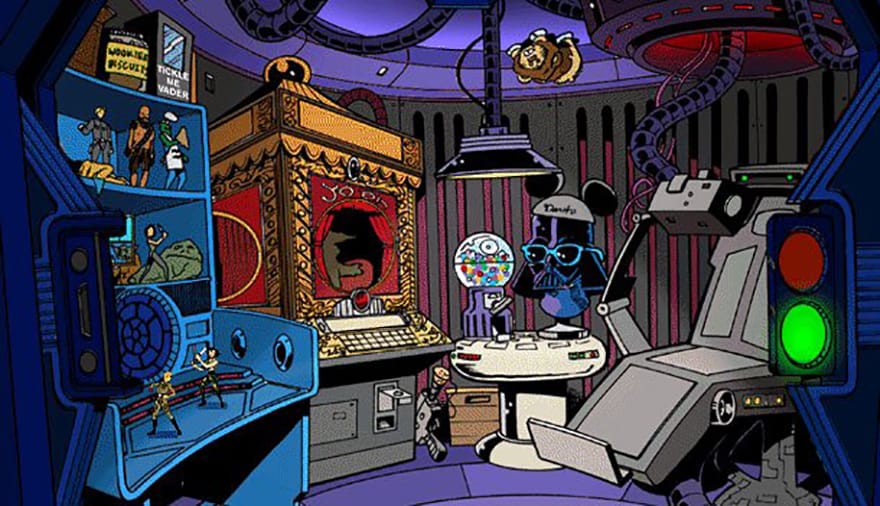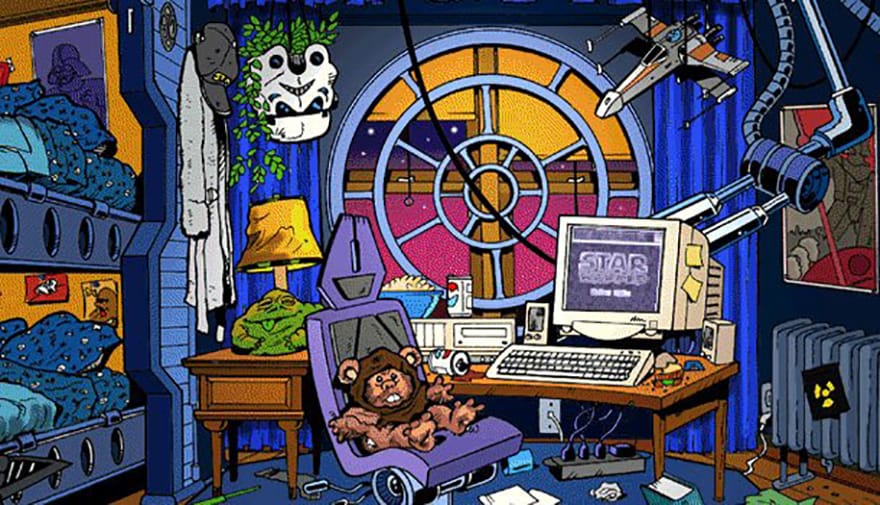A few things I learned from the late-90s game about nerds, Star Warped

A word of warning. This is an article about Star Warped, a comedic CD-Rom and a comet made of raw 1997 that swung by this planet without many noticing. Parts of this summation are painfully, extraordinarily, and sickeningly 1997, so if you’re concerned about hearing a dial-up tone in your head similar to the whir of tinnitus—be warned.
I first saw it on Splat!, a magazine-style program for the then-new animation specialty channel Teletoon. The segment was about cartoons in videogames, a cross section that couldn’t have possibly been more eclipsing for a kid who gave himself nightmares retrying Brain Dead 13 just to get more glimpses of its grotesque hand-drawn landscape. The main subject of the segment wasn’t Don Bluth or ClayFighters, but an obscure-then and obscure-now studio that shuttered when The Learning Company bought out its parent studio Palladium in 1998. This company was called Parroty Interactive. Their title card showed a red parrot in Groucho glasses to the chorus of a tinny, whirly CD-ROM cartoon march, and closed with the sound of that bird of paradise coughing out its cigar.
Parts of this summation are painfully, extraordinarily, and sickeningly 1997
In the same vein as other distractionware popular in Windows office culture, Parroty exclusively made joke mounds and minigames, interactive MAD Magazines riffing on items from the mid-90s ecosystem, such as Bill Gates (Microshaft Winblows), X-Files (X-Fools, nice one) and Myst (Pyst, which starred John Goodman and had an unreleased sequel, Driven). Star Wars was the pop culture circus I was most familiar with. I wasn’t invested in Chris Carter or Silicon Valley. Meanwhile the theatrical Special Edition re-releases and Nintendo 64’s Shadows of the Empire put Star Wars on the tongue of every schoolyard, so it was Star Warped that I begged my parents for after seeing the company’s profile. I begged my parents for this game.
We often reminisce of the ways games influence us. We do it all the fucking time. How the craftsmanship of Mario and Mega Man installed instincts in us like we were ourselves computer hardware, and we routinely return to those illustrations because they seem like the most universal.
This tendency changes from person to person. Take me, for example: Super Mario Bros. wasn’t my first Nintendo game. Bubble Bobble was my first Nintendo game, and from it I learned that games can be joyous, and dizzying, and supremely devastating. A younger version of myself crumbling in a fit of tears to my father, overcome that I couldn’t demolish the infamous Level 57. And you know what else? My home computer sucked when I grew up, the majority of games were off shareware demo disks or Monopoly. Star Warped was my first PC game, the first I sought out and fished back home. So I’m going to treat it with the same dignity, history and lessons that your first PC game gave you. So here are the things that this game taught me.

What Brian Posehn’s Voice Sounds Like
There exists about 10 minutes of never-published footage of me and comedian Brian Posehn talking backstage after one of his shows. We were smoking. During his performance he whimpered because someone in the back had already started lighting up, and he compared the smell to the dog hearing the can opener. Those rebels approached him immediately as he walked off the stage, and smoking circles began. Miraculously he didn’t have any jabs about my eye-patch, which I was wearing during an infection, and my editor was fine with me wearing during an on-camera interview (then again: never published). The point being is everyone was in a nice, toasty shape, and I lobbed some insanely stupid questions. The only one I even remember being, “Your uncanny voice is a huge element of yours. What would you do if someone else could impersonate you?”
“I don’t know,” replied Posehn, “they could have it.”
Brian Posehn is a doped-up sasquatch, his tone cruising between surly weiner and sleepy rage. During a date that ended up with watching the “Lost Episode” of Mr. Show, we commented on his unique sort of presence, which is an odd thing to say about a bald man in glasses lumbering out of a parking lot and throwing a tape into the air.
In Star Warped, Brian Posehn plays, uh, Brian, opposite Robbie Rist (Cousin Oliver from The Brady Bunch) as his brother Aaron in a messy Modesto, California apartment. The two have amassed a collection of merchandise from the Star Wars sprawl, letting the player explore their piles of junk, pirated security footage from Skywalker Ranch, fake international posters and action figures (including Pizza-Flipping Greedo and a Princess Leia modded into GI Jane by their feminist sister).
Brian Posehn is a doped-up sasquatch
Other games include a You Don’t Know Jack parody, a first-person jaunt as a Rebel paparazzi trying to snag photos of Vader’s affair with Boba Fett, and a nugget-sized arcade game where you man the Death Star and blast all the space junk threatening your hull. Though Rist sounds like a squeaky asthmatic alien that you’ll hear across the voice acting roster, Posehn’s slob mystique stuck even then. It’d be years until I picked it back up with his work in Mission Hill as the stoner roommate, but I could still recognize his performance as the vastly different character, dweeby brother.
Not all Insults are Actual Insults
In grade school, you have priorities. You want to see pornography, even though you have no sexual attraction to the material, and you want to learn swear words. Swear words are your magical spells as a kid, and the more you have collected the more powerful and influential you become amongst friends. The most important swearing warlock.
Nerf Herder is not an actual swear word.
It is strewn though Star Warped as the meanest thing to call someone. When it appeared in Star Wars itself (Leia to Han in Empire Strikes Back) I think it just high-dove through one ear and right out the other, one of those classic milliseconds of the original trilogies to spawn shirts and memes for actual generations. But at the time I didn’t know that. I just knew that it got lobbed constantly by Aaron, Brian, their sister and in some clips from a what-if version of Star Wars written by Jerry Seinfeld (the staleness of that concept was resuscitated in Netflix’s With Bob & David). Each time the characters become livid and winded as if they had just been slandered. I had to try this swear out.
It sure didn’t catch on in the schoolyard. It sounded alien. It IS alien, and it lacked the kind of punch as “fuck” and “ass,” the most revered in spoken grade-school contraband. I rhymed it during dinner around my parents to see if I could get a rile if they thought I said it. Nerd birder. Burp shirter. Nothing. I spit out nerf herder during a game of catch and my dad must have just thought I was being random; the truth is much sadder. Nerf herder is no curse word.

The Word “Splice”
There is one actual term that Star Warped taught me. A few of the sections of Star Warped are less of a game and more of an activity center. One is a time machine, where you can see R2 being taken out of his packing peanuts box or a golfing Vader in his twilight years. The other was a “Gene Splicer,” a concept I didn’t really understand when I first played the game.
Splice, as you may know, means to turn two things into one. Had I known that, I would have known that you have to put in two of the cassettes labeled after the series’ main characters in order for the machine to work. Ignorant and patient, I would put in each of the cassettes, one at a time, and wait for something to happen, maybe load or buffer or some mechanical concept, as the game’s white noise of engine hums and light bulbs looped. After no prompt from the game, and just a bunch of clicking around, I figured it out, reverse-engineering the meaning of splice and learning that Chewbacca spliced with Darth Vader would be Howard Stern.
And who knows: without these life lessons, maybe I wouldn’t be the person I am today, an adult who writes about videogames.



